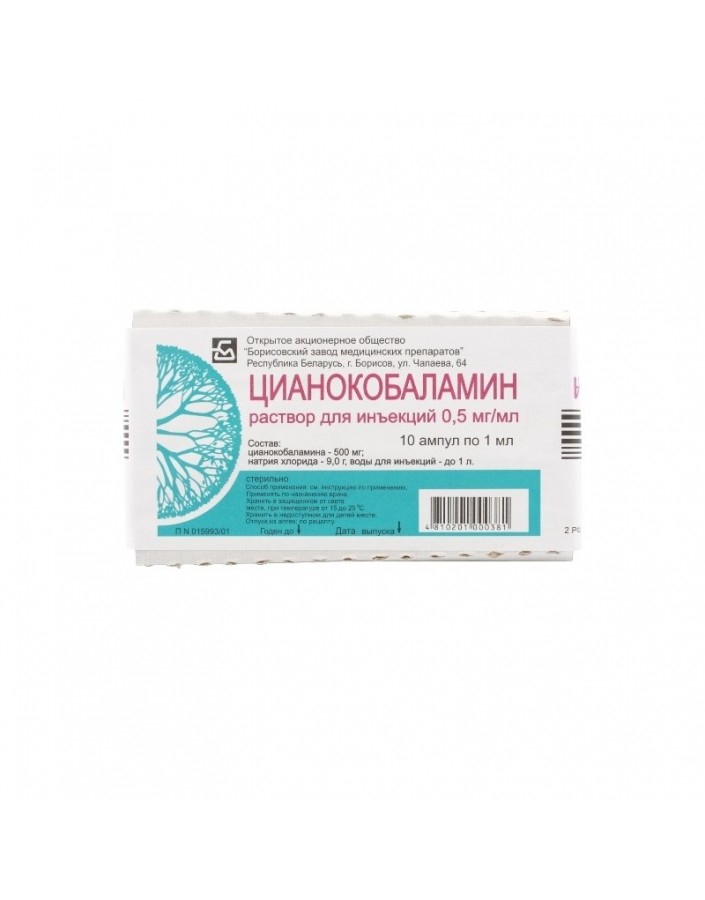




Security policy (edit with Customer reassurance module)

Delivery policy (edit with Customer reassurance module)

Return policy (edit with Customer reassurance module)
Injection
1 ampoule contains: cyanocobalamin - 500 mcg.
Excipients: sodium chloride, water for injection.
In the package 10 ampoules.
Cyanocobalamin has an erythropic, hematopoietic, antianemic, metabolic effect. High biological activity ensures the participation of cyanocobalamin in lipid, carbohydrate and protein metabolism. Stimulates the ability of tissues to regenerate, normalizes blood formation processes, functions of the nervous system and liver, activates the blood coagulation system, increases the activity of prothrombin and thromboplast (in high doses), reduces the level of cholesterol in the blood. In the body, it is transformed into a cofactor, cobamide (the active form of vitamin B12), which is involved in the transfer of methyl groups and other single-carbon fragments and is necessary for the formation of DNA and deoxyribose, methionine, creatine, and choline. Accelerates the process of maturation of erythrocytes, contributes to the accumulation in them of compounds with sulfhydryl groups, thereby increasing their tolerance to hemolysis.
Cyanocobalamin is absorbed in the small intestine (partly in the large intestine), combining with the internal factor, becomes protected from the intestinal microflora. In the mucosa of the small intestine, the complex transmits vitamin B12 to the receptor, which transports it into the cell. In the blood, cyanocobalamin combines with transcobalamin I and II, with which it is transported into tissues. Cyanocobalamin is deposited mainly in the liver, excreted from the liver and bile into the intestine, from where it is again absorbed. Eliminated from the body by the kidneys. It penetrates the placental barrier.
Cyanocobalamin is used in the treatment of chronic anemia occurring with vitamin B12 deficiency (alimentary macrocytic anemia, Addison-Birmer disease), as part of a complex treatment of anemia (posthemorrhagic, iron deficient, aplastic), as well as anemia caused by drugs or toxic substances Used in the treatment of chronic hepatitis, cirrhosis of the liver, liver failure; alcoholism, prolonged fever; polyneuritis, neuralgia (including trigeminal neuralgia), radiculitis. Vitamin B12 is prescribed for the treatment of funicular myelosis, malnutrition, injuries of the peripheral nerves, cerebral palsy, amyotrophic lateral sclerosis, and Down syndrome.
Cyanocobalamin is indicated for skin diseases: psoriasis, herpetiform dermatitis, photodermatitis, atopic dermatitis.Cyanocobalamin is also prescribed for radiation sickness, sprue, migraine, malignant neoplasm of the intestine and pancreas, for long-lasting infectious diseases, kidney diseases. For the purpose of prophylaxis when using PASK, biguanides and Ascorbic acid in large doses, in case of intestinal and gastric pathologies with impaired absorption of vitamin B12 (resection of the small intestine, part of the stomach, Crohn's disease, malabsorption syndrome, celiac disease).
Cyanocobalamin is contraindicated for use in case of hypersensitivity to the drug, erythremia, erythrocytosis, thromboembolism, pregnancy, breastfeeding.
With caution used for angina, benign and malignant neoplasms, which are accompanied by a deficiency of vitamin B12 and megaloblastic anemia.
There are some data on the possible teratogenic effects on the fetus of large doses of B Vitamins, and therefore do not use Cyanocobalamin during pregnancy.
Cyanocobalamin is used subcutaneously, intramuscularly, intravenously and intralyumbalno.
In the treatment of Addison-Birmer disease, 100–200 mcg per day is prescribed every other day; for macrocytic anemia with neurological symptoms, 500 μg or more per administration (daily for the first week, then 5-7 days between injections).In case of post-hemorrhagic and iron deficiency anemia, cyanocobalamin is prescribed in 30-100 mcg 3 times a week; in the treatment of aplastic anemia, 100 mcg before the clinical and hematological improvement. In the treatment of nutritional anemia in premature babies and young children, vitamin B12 is prescribed at 30 micrograms per day for 15 days.
In case of neurological diseases and pathology of the central nervous system, 200-500 mcg per injection is administered, with a gradual increase in dosages, while improving the condition, the dose is reduced to 100 mcg per day. The course of therapy is 2 weeks.
In traumatic lesions of the peripheral nerves, cyanocobalamin is used in doses of 200-400 μg every other day for 45 days.
With cirrhosis of the liver and hepatitis - 30-60 mcg daily or 100 mcg every other day. Therapy is designed for 25-40 days.
With Down's disease, dystrophy in children, cerebral palsy - 15-30 mg per day.
In the treatment of amyotrophic lateral sclerosis, funicular myelosis, multiple sclerosis, cyanocobalamin can be administered intralumbally at 15-30 micrograms with dosage increases up to 250 micrograms.
When Cyanocobalamin is used, allergic reactions (usually in the form of urticaria), cardialgia, tachycardia, dizziness, headache, agitation are possible. When used in high dosages, hypercoagulation and a disturbance of purine metabolism are rarely observed.
When angina should be used in a single dose of not more than 100 mg.
Pharmaceutically, cyanocobalamin is incompatible with ascorbic acid, riboflavin, and salts of heavy metals. Salicylates, antiepileptic drugs, aminoglycosides, colchicine reduce the absorption of Cyanocobalamin. Vitamin B12 should not be combined with drugs that increase blood clotting. Incompatible in the same syringe with vitamins B6 and B1. Cyanocobalamin is able to intensify allergic manifestations caused by vitamins B1.
In the dark place.
Cyanocobalamin